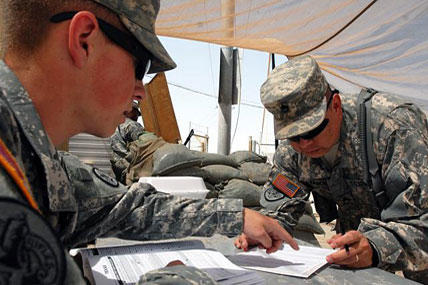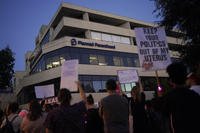Americans might have to wait until well after Tuesday to find out the winner of the presidential election, which means a spotlight could again shine brightly on the absentee ballots submitted by servicemembers much like what happened during the recount in 2000.
As many experts predicted, the final polls indicated a historically tight presidential race between President Obama and former Gov. Mitt Romney. Campaign teams have already assembled teams of lawyers in case the election is close enough to demand a recount in battleground states like Ohio or Virginia.
Many service members vote using absentee ballots, some of the last votes counted in an election. These ballots received extra attention in 2000 when the difference in some Florida counties was measured in the hundreds.
Democrats and Republicans have already squabbled over the military vote in Ohio after the Democrats sued the state for restricting the expansion of early voting times to military members only. Ohio attempted to allow early voting to servicemembers only over the weekend and the Monday before Election Day.
Republicans claimed it was an attempt to discourage the military vote. The Democrats responded saying they wanted to extend those voting rights to all Ohio voters to include the military. In the end, Ohio opened early voting to Nov. 3-5 to all residents.
Election officials have seen a record number of early ballots submitted before Tuesday. About 30 million Americans submitted their votes before Nov. 6. With the increased volume of non-Election Day votes, the military absentee ballots might play less of a roll in the recount.
"Increased access to early/no-fault absentee voting is changing American elections," said Kyle Kondik, an election expert with the University Virginia Center for Politics.
Legal teams will take a hard look at a new initiative allowing troops in certain states to send their ballots electronically. Officials in 31 states allowed U.S. troops and overseas civilians to submit their absentee ballots via e-mail or fax for the first time.
Critics suggested that allowing troops to send their absentee ballots over the Internet made their votes easy targets for tampering. Election officials argued that making it easier to vote for servicemembers trumped the security concerns pointing out how many states already allow digital voting booths.
Hurricane Sandy could further complicate a recount, especially when tallying absentee ballots. The storm hit the East Coast on Oct. 29 when some voters hoped to receive their ballots in time to submit them before Tuesday’s deadline.
In the hardest hit regions like New Jersey and New York City, mail delivery was delayed for days and voters have reported not receiving ballots they requested by Tuesday. It’s unclear how many servicemembers may not have received their ballots in time.
"We don't keep statistics on the possible number of ballots that could be delayed due to Hurricane Sandy," said U.S. Postal Service spokesperson Darleen Reid in a statement. "There is no way to determine this at this time."
As head of the Federal Voter Assistance Project until earlier this year, Robert Carey Jr. has been a vigilant advocate of military voting, ensuring troops have the ability to vote not matter where they are and under what conditions.
He was surprised this month when he became a beneficiary of that advocacy.
"I became a military voter myself when I got recalled to help out on [Hurricane] Sandy," Carey, a captain in the Navy Reserve, said in an email Monday afternoon. "Luckily, because of the grant FVAP had given Maryland, even at that late date, I was able to electronically request and receive my ballot in time to return it."
The FVAP in 2011 awarded more than $25 million to the states, as well as to some localities, under a project called Electronic Systems for Elections, or EASE. The goal was to improve voting processes for military and overseas voters by reducing impediments to voting and stimulating the use of innovative technologies, according to FVAP’s website.
According to backers of the program, the number one failure when it has come to counting military and overseas ballots is that they arrive at the local polls after the deadline for counting absentee ballots.
The EASE grants marked the first time that the Defense Department, which oversees FVAP, awarded funds to states and localities through a competitive process for voting assistance, according to the Congressional Research Service.
"There probably wouldn't have been the systems [in place] without it," Carey said. Twenty-seven states were awarded the grants, with most of the money funding online ballot delivery systems now in place or to be established over the next five years or so, he said.




























